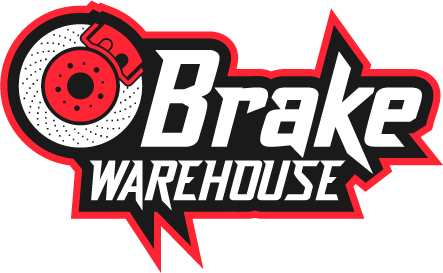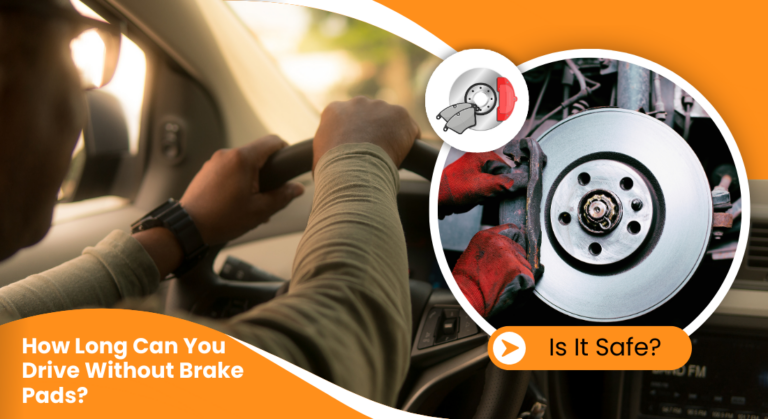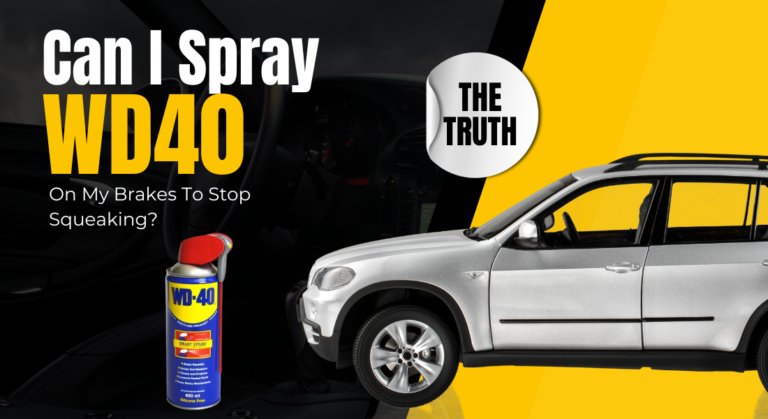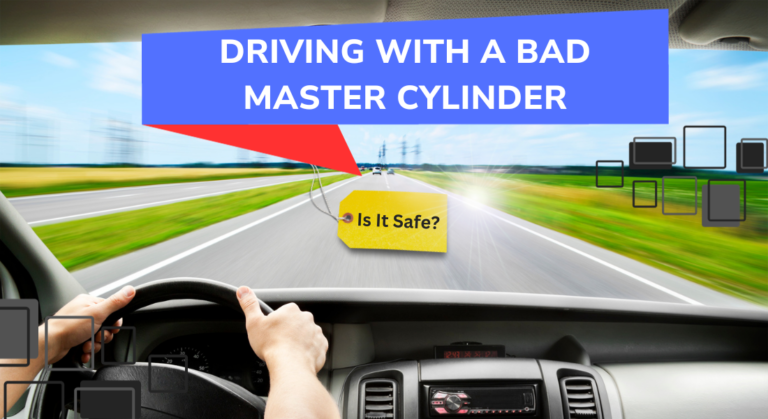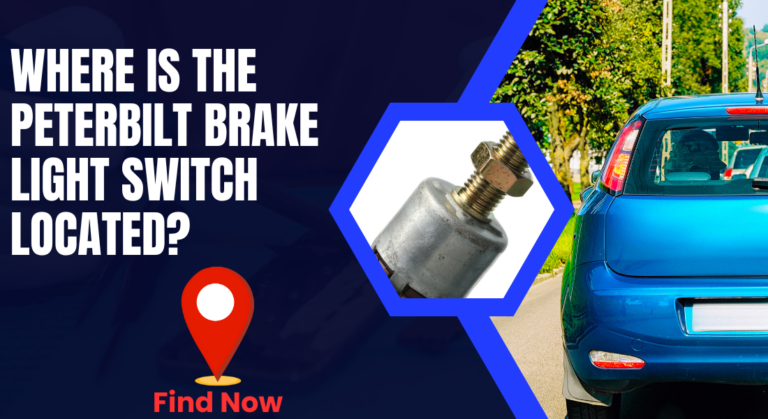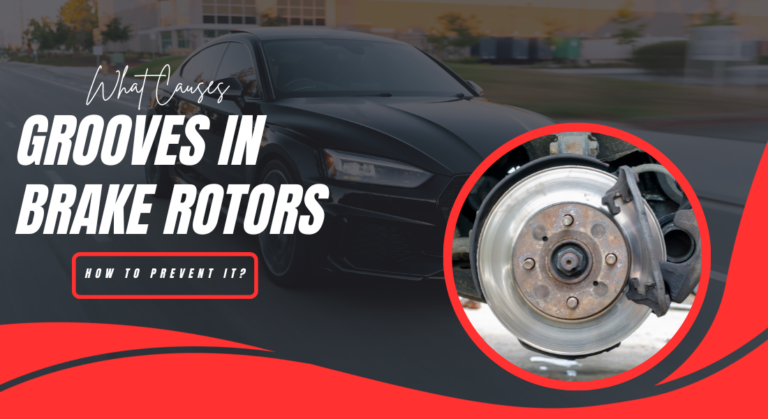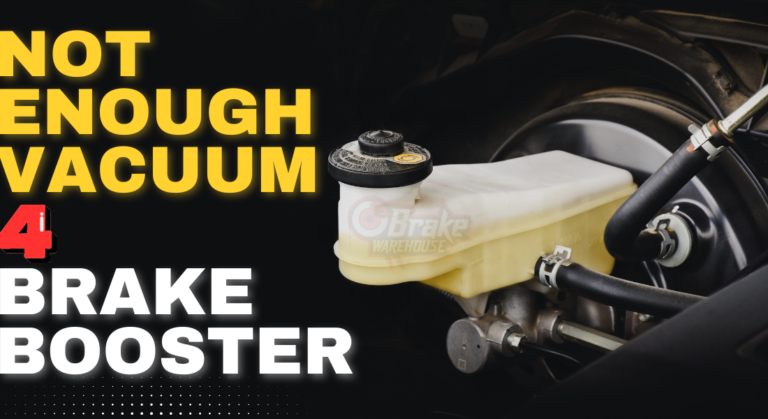Clicking Sound when Pressing Brake Pedal – Causes & Fixes?
Brake pedal clicks when pressed is a common car problem after a few years of buying. However, it can appear in new vehicles as well. The sound indicates that you need a brake job. So, what causes a clicking sound when pressing the brake pedal? Many culprits are there.
A stuck stone and damaged brake pads are the primary reasons for the clicking sound. Also, a worn-out anti-rattle spring and a warped rotor can cause the issue. Another less likely reason is a defective wheel bearing.
Let’s look closer at the reasons and solutions to the clicking sound when pressing the brake pedal.
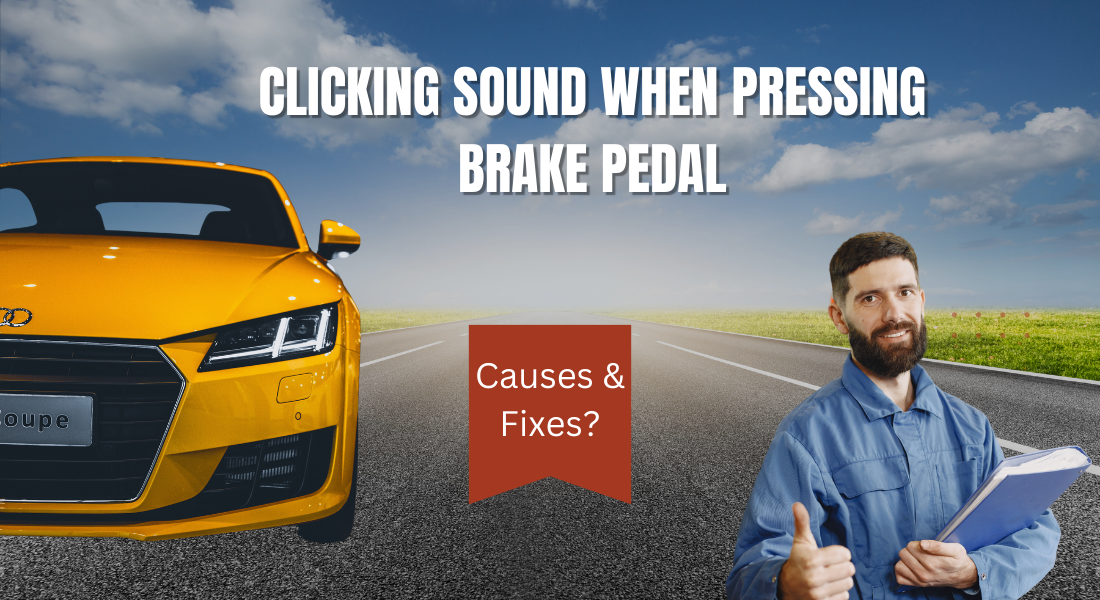
What Causes Clicking Sound when Pressing Brake Pedal?
To determine the cause, have a mechanic inspect the issue. A clicking brake pedal could indicate potential brake failure. However, before considering brake replacement, consider the below potential causes.
1# Stuck Stone in the Braking System
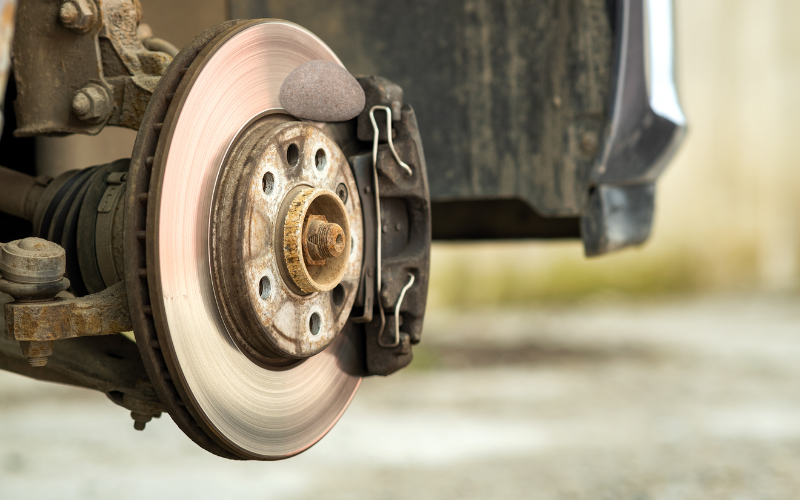
When a stone lodges in your car’s braking system, you will hear a clicking sound after pressing the brake.
A stuck stone prevents the pressure from even distributing throughout all 4 wheels. Such instability creates a clicking noise when you press the brake.
Solution
Step 01: Inspect the braking system for any stuck or lodged stone.
Step 02: If you find any, grab a pair of pliers and remove the stone immediately.
Step 03: Sometimes, you may need help finding a stone. In this case, uninstall the brake calipers and look for stones inside them.
Step 04: Inspect all the components for wear and tear once the stone is removed from the system. Make sure every part is functioning properly. The inspection includes,
- Heat spots
- Loose fasteners and bolts
- Uneven damage on the rotors
- Checking brake pads for uneven wear patterns
- Damage seals
Finally, reassemble the brake caliper.
Read Also: How To Free a Stuck Brake Caliper Piston?(11 Steps Guide)
2# Damaged Brake Pads
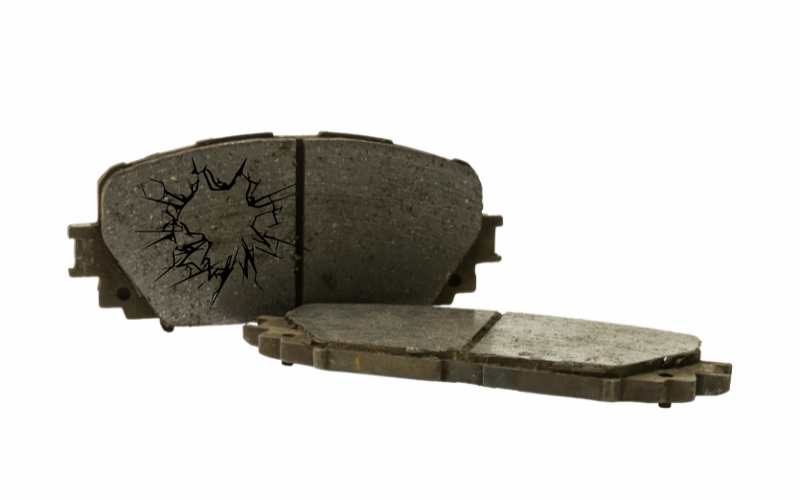
Damaged brake pads are a severe concern for any vehicle as they can lead you to unwanted accidents. Due to worn-out pads, you may hear a click when the brake is pressed.
The sound is created when the metal surface of the caliper and rotor become uncovered and friction with one another when the pads are excessively worn to offer sufficient cushioning.
In worst cases, metal-on-metal contact can increase, leading to excessive noise, damage, and wear.
Solution
Step 01: Thoroughly inspect the brake pads for potential damage. Generally, defects roughly 3mm deep can be considered damage. In this case, replacing the brake pads is the best solution.
When choosing the brake pads, make sure they are compatible with the make and model of your car.
Step 02: Look for rust or discoloration on the rotor, which can happen from overheating or overuse. The best solution is to replace the brake rotors.
3# Loose Brake Calipers
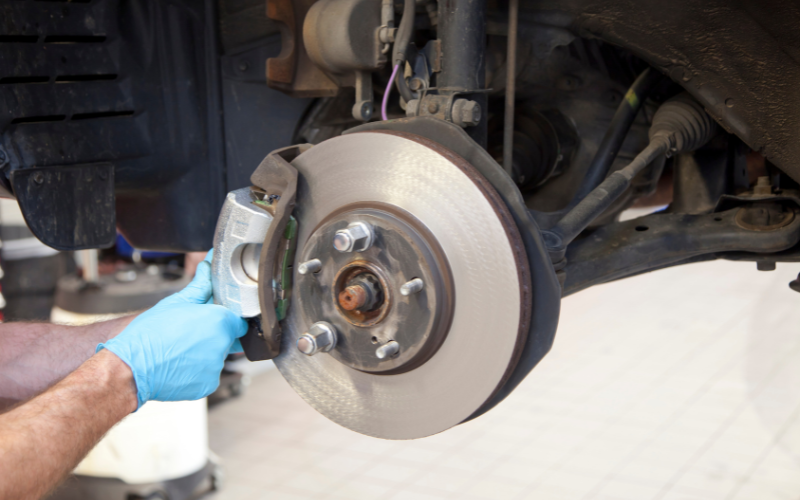
Brake calipers are responsible for squeezing the brake pads on the rotor when the brake pedal is pressed. This action creates friction within the brake rotor and slows your vehicle down. Loose brake calipers can create a click noise when they are loose.
Why do brake calipers get loosened?
It can happen for the following reasons,
- Loose caliper bracket bolts
- Stuck slide pins that attach the caliper to the bracket
Solution
Step 01: Inspect all 4 wheels. Ensure the secure attachment of all 4 calipers to their respective brackets by inspecting any signs of loose bolts or nuts.
If the bolts or nuts are loosened, use a suitable socket set or wrench to tighten them. Apply some thread lock liquid to prevent further loosening of the bolts.
You can solve the problem easily by following the above steps. If not, follow the next step.
Step 02: The slide pins can get jammed because of contaminants or rust. Brake cleaner spray will be an ideal solution to free up these pins.
All you need to do is,
- Spray the brake cleaner around the jam slide pins.
- Clean the rust or contaminants using a rag and wire brush
- Once the jam is loosened, remove the pins
- Apply some anti-seize lubricant liberally. This will protect the pins from rust or corrosion
- Reattach the pins
Read Also: How Can You Check Slack Adjuster? (Step by Step Guide)
4# Warped Brake Rotors
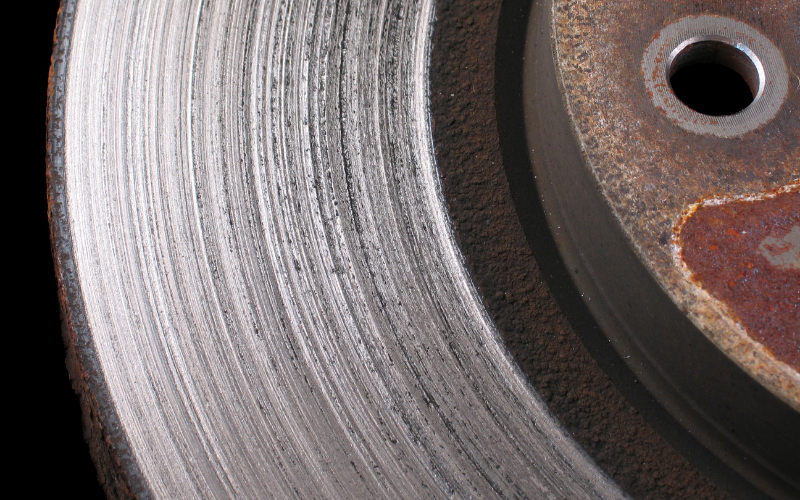
Excessive heat build-up in the braking system is the primary reason for warped brake rotors. When you frequently hit the brake harder, the brake system experiences overheating.
As a result, warping of the rotor occurs, leading to an uneven surface. This uneven surface is responsible for the clicking noise. Moreover, it can cause vibration.
If you don’t address the problem on time, further damage can worsen the situation.
Solution
Burnishing the brake rotors
Correcting warped brake rotors involves a series of actions based on the severity of the issue. Among these, the simplest but less dependable method is “burnishing.”
Typically employed on new or replaced rotors to facilitate their initial use. Burnishing can also be applied when addressing minor warping in your existing rotors.
So, how to do this?
Step 01: perform around 30 slowdowns from 40 mph to 20 mph using a moderate to gentle brake pedal force.
Step 02: Conduct this procedure on an empty road where sudden stops are unnecessary. Such actions could exacerbate the condition of your overheated brake rotors.
The rotors will overheat for the burnishing process and leave an even surface. However, brushing is unreliable as it fails to solve the overheating problem in your car’s braking system.
Rotors replacement
Replacing the bad rotors is a reliable way to fix the clicking sound when pressing the brake pedal. Choose a premium-quality rotor designed to withstand excessive heat and pressure to prevent warping in the future.
At the same time, checking the braking system components for wear and tear is crucial. This can help you solve possible damage.
5# Damaged Anti-rattle Spring
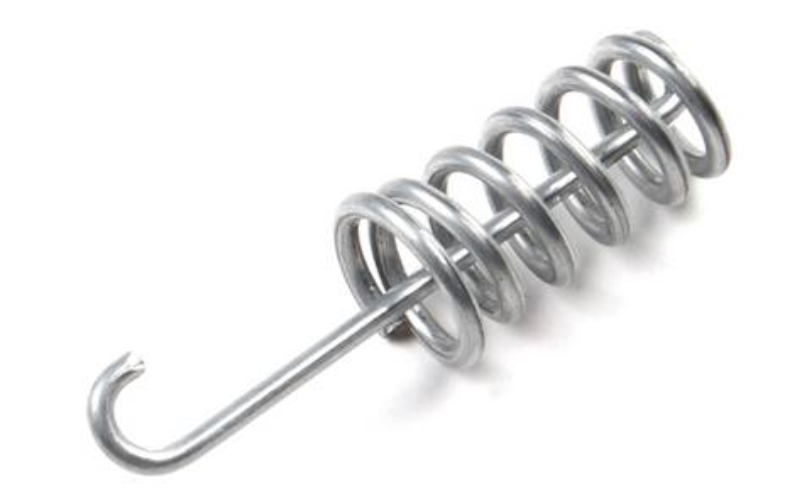
The clicking noise can also appear from a deteriorated or corroded anti-rattle spring beneath the brake pads.
These springs absorb excess pad movement, ensuring even pressure distribution for simultaneous engagement during braking.
However, when this spring rusts or wears, it loses its ability to absorb braking energy efficiently. Also, it needs to distribute pressure across the pad evenly.
Consequently, gaps form between the pad and rotor, leading to uneven braking action and the audible click sound upon braking. It can cause expensive future repairs if neglected.
Solution
Check the anti-rattle spring condition and replace if required.
6# Loose Wheel Bearings
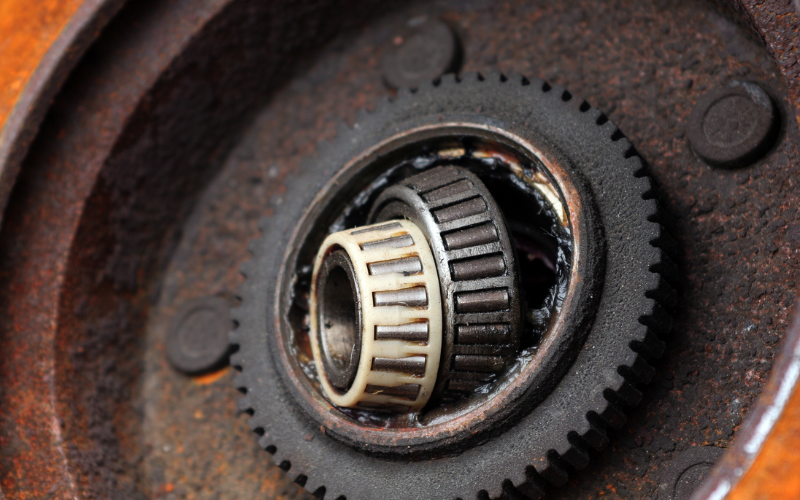
The loose wheel bearings are among the most common reasons for clicking sound. The wheel bearing supports the wheel and its parts. If the bearings are not fitted securely, they move around and create a sound.
Incorrect installation is the prime cause of loose wheel bearings. It means that the bearings needed to be tightened correctly or maintained properly. Moreover, inadequate lubrication can also cause the problem. Furthermore, the wheel can be damaged over time or heavy use.
Diagnosing a loose wheel bearing involves examining the wheel hub assembly for wear signs, like cracks or excess use. Also, assess related components like ball joints and suspension linkages for looseness.
Solution
Happily, solutions are pretty straightforward. Follow the below steps.
Step 01: Buy new and high-quality bearings and replace the damaged ones.
Step 02: Make sure to lubricate the bearings before installing.
Step 03: When fitting, ensure proper tightening of fasteners using hand tools or low-torque impact wrenches to prevent over-tightening.
Afterward, a follow-up test drive confirms noise reduction. If not, a different issue may be at play, warranting further investigation.
Read Also: Scraping Noise When Braking – Why & What You Should Do?
FAQs
Can weather or temperature changes lead to clicking sounds when braking?
Yes, temperature fluctuations can cause brake components to expand or contract, potentially leading to clicking sounds. This often occurs due to the interaction between materials under varying thermal conditions.
Are there differences in the clicking sound from the front or rear brakes?
Yes, the clicking sound’s location (front or rear) might indicate specific brake component issues. Front clicking could relate to worn pads or loose parts, while rear clicking might involve drums or hardware.
Final Words
Hopefully, you are now well aware of what causes a clicking sound when pressing the brake pedal.
Complications in your vehicle’s braking system can pose serious risks during road travel. Persistent clicking noises coming out from your pedal indicate brake failure. The rattling and clicking sounds indicate a concern within your braking system.
If your vehicle’s braking system requires significant repairs, it’s recommended to seek the expertise of a mechanic.

Meet Zayan, the mechanical genius behind the highly acclaimed brakes problems and solutions website. With over a decade of hands-on experience in the automotive industry, Zayan has become a trusted authority in the realm of brake systems.
His passion for cars, coupled with his expertise in solving complex brake-related issues, has earned him a devoted following of car enthusiasts, mechanics, and everyday drivers seeking reliable guidance.
